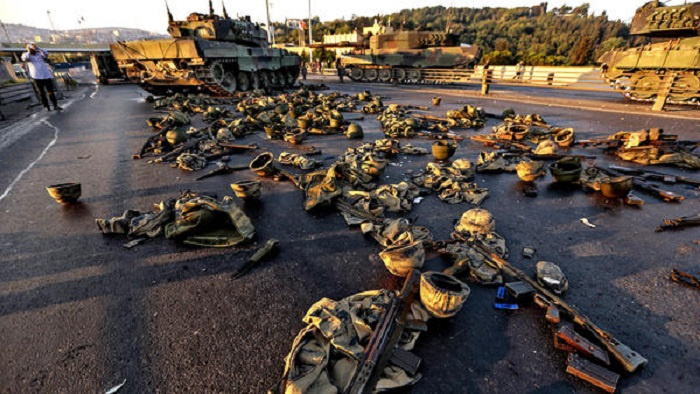Reflections on Coup and Countercoup in Turkey

By: Kaveh L. Afrasiabi
As the dust settles on the attempted military coup in Turkey, which was entirely subdued by a combination of courageous citizens' resistance and (fractured) army intervention, the extensive government crackdown on the coup-makers and their alleged sympathizers reflects a major political crisis that will likely continue in some capacity for the foreseeable future.
Although President Erdogan has termed the coup a "divine blessing" and has seized on the coup to put an end to the serious, and growing, challenge to the status quo posed by the Gulen Movement, the mere purge of thousands of army officers, judges, and government personnel, including in the education department, indicates the sheer depth of the crisis -- that might have dislodged Erdogan had it not been due to sheer luck, timely rescue tip by an army general, and inadequate planning by the coup-makers, reportedly led by a former air force chief, Akin Octurk. according to the Turkish press, Octurk and some 112 other generals and admirals have been arrested, as well as some 35000 other soldiers, police, and others, indeed an extraordinary development comparable only to the 1982 coup.
In hindsight, it appears that Erdogan and his ruling Justice and Development Party (AKP) had a contingency plan for such a scenario, i.e., declaring open warfare on the Gulen Movement to root out its support, such as by seeking the extradition of 77 year old Mr. Gulen from his sanctuary in the US, which will likely be reluctant to turn him over to Ankara. This is, however, a big challenge. For instance, with the purge of 1500 rectors and deans of universities, which are due to open in two months, who is going to run Turkey's universities?
This aside, even though the coup was staged in the name of "restoring democracy," the upshot of the failed attempt is that it has been crushed by a resurgent Erdogan who will use the opportunity to consolidate his authoritarian grip on power at the expense of Turkish democracy. With the Turkish population concerned about both ISIS terrorism and, even more so, Kurdish separatism and nationalism, the Turkish government led by Erdogan is intent on a major crackdown, practically ending the traditional independence on and autonomy of the Turkish military. Hinting that the US has been behind the coup, Erdogan has also raised new questions about the future of US-Turkey relations, in light of Turkey's role as a key NATO member and front-line state vis-a-vis ISIS.
In light of a recent comment by US Secretary of State John Kerry on the reliability of Turkey's NATO partnership, the failed coup is likely to raise anew the brewing arguments in favor of expelling Turkey from NATO. Although that is unlikely in the near future, nonetheless the mix of post-coup developments, such as the attempt to reinstate death penalty, may infuse new interests in this argument, in light of serious questions regarding Turkey's reliability in the fight against ISIS.
For now, however, what is clear is that Erdogan will utilize the failed coup's windfall as a mechanism for political mobilization to tackle the Kurdish problem that extends to Syria and Iraq, given US's support for Kurdish independence opposed by Turkey. This is a major thorn in US-Turkey ties that will likely linger on for the foreseeable future. Simultaneously, what is less clear, is the future of democracy in Turkey, now mortgaged to the 'Sultanist' Erdogan more than ever before.

